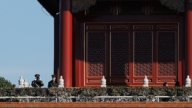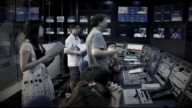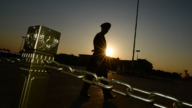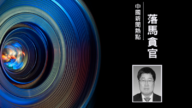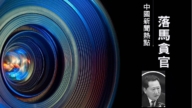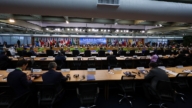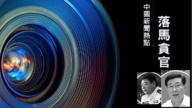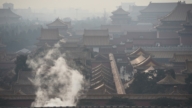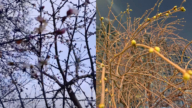【新唐人2012年12月10日讯】7号,中共总书记习近平前往广东深圳,开始了上任后的首次离京巡视。异乎寻常的是,大陆官媒对这次视察并没有的太多报导。海外媒体则把他与20年前的邓小平南巡相比,揣测习近平南巡的各种用意。有评论指出,习近平南巡与胡锦涛稍早前到贵州的“告别之行”,都是作为中共对内和对外宣传的需要。这也表明,中共新班子将继续走“政左经右”的老路。
港媒报导说,习近平7号抵达深圳,随后前往“前海深港发展区”参观,并造访了大陆知名互联网公司“腾讯”的总部。 8号上午,习近平来到福田莲花山公园,向邓小平像献花并植树。
习近平升任中共总书记一职之后,把首次离京视察的地点,选在一直被中共称为改革开放前沿的广东、深圳,引来各界的推测。香港《明报》报导,邓小平当年设立“深圳特区”,曾经三次到访。 1992年,邓小平通过视察深圳等地发表“南巡讲话”,为中共划定以经济建设为核心的所谓“改革开放”路线。可以说,深圳与邓小平的关系密不可分。习近平通过向邓小平献花,来试图展现自己传承邓小平路线、力挺“改革开放”的形象。
纽约“民主大学”校长唐柏桥向《新唐人》分析指出,不管习近平是否会继续邓小平的“改革开放”路线,都不会从根本上改变中国的现状。
纽约“民主大学”校长唐柏桥:“比方说它现在把这个体制,国务院从20几个部改成10几个部,多搞几个民主党派担任副市长、副省长,然后再搞一下体制内基层的人大选举。但是它照样迫害法轮功、照样在镇压各种异议人士。”
唐柏桥认为,邓小平本人是屠杀人民的刽子手,而他为中共确立的“改革开放”路线,更是对中国民众的蒙蔽。
唐柏桥:“他是用一种非常狡猾的方法,延续共产党的独裁统治、蒙蔽控制人民。一边对人民实行掠夺、镇压,另一边给人民糖衣炮弹、给一个梦幻、给一个虚幻的美好未来。”
中共前总书记胡锦涛在上月举行的中共十八大上声明,中共“不走老路、不走邪路”,这被外界认为是中共拒绝进行真正政改、继续推行“政左经右”的宣言。
上个月1号到6号,胡锦涛更是前往贵州遵义展开“红色之旅”,胡锦涛曾经主政贵州3年,这是他卸任中共总书记之后的首次外出巡视。但是,胡锦涛的“告别之行”,官方媒体直到12月6号才公布。
唐柏桥:“是因为共产党统一了(口径)的,这就是做给国际社会看的。做给外面看的,对内,胡锦涛到遵义去。因为国际社会的标准要高得多,对中国(中共)政府的要求。”
唐柏桥谈到,当今世界,专制独裁政府的解体已成大势所趋。包括缅甸、越南等国家都在发生民主变革,但中共并没有任何开放党禁、报禁的意向。唐柏桥指出,对中共官员来说,出路只有一个,就是回到人民中来。
唐柏桥:“什么叫回到人民的怀抱中?就像现在缅甸吴登盛的做法:释放政治犯,还翁山苏姬自由,允许人民自由选举,允许人民有自由言论,欢迎海外异议人士回国。”
唐柏桥强调,现在中共已经远远被国际社会甩在后面,面临着被人民淘汰的命运。
采访/刘惠 编辑/李谦 后制/肖颜
What’s Behind Xi’s Visit to Shenzhen?
On December 7th, Xi Jinping arrived in Shenzhen,
which was his first official visit outside Beijing as new leader of the Chinese Communist Party (CCP).
Oddly, mainland media did not pay much attention
to Xi’s activities in Shenzhen.
On the other hand, foreign media tried to read Xi’s visit
by comparing it to Deng Xiaoping’s tour to southern China 20 years ago.
Analysts remark Xi’s southern tour and Hu’s “farewell visit”
to Guizhou were both due to propaganda needs.
This suggests that CCP will continue its strategy
of “left politics, right economy.”
According to Hong Kong media, Xi Jinping arrived
in Shenzhen on December 7th.
He visited Qianhai development zone and the headquarter
of Tencent, a famous information technology corporation.
On the morning of 8th, Xi visited Linhuashan Park
in Futian borough.
He planted trees there and presented flowers
to the statue of Deng Xiaoping.
As the new CCP leader, Xi chose Shenzhen
to be the first place of his visit outside Beijing.
This leads to a lot of speculations since the CCP always
regards Shenzhen as a frontier of its economic reform.
Hong Kong’s Ming Pao published an article mentioning
Deng Xiaoping’s three visits to Shenzhen, which he established as a special area for his reform.
In 1992, Deng visited Shenzhen and other cities
in presenting his “southern tour speeches.”
Those speeches defined the CCP’s route of “Reform and
Opening up,” which regarded economic development as the key target.
Shenzhen is a place closely associated
with Deng Xiaoping.
Therefore, Xi may attempt to present himself a supporter
of the “Reform and Opening up,” by presenting flowers to Deng’s statue.
President of New York Democracy University Tang Boqiao
spoke to NTD on the issue.
Tang thinks, whether Xi continues Deng’s route of
“Reform and Opening up” or not, the situation in China will not change significantly.
Tang Boqiao (President, New York Democracy University):
”The CCP can make some changes in its framework.
For example, the State Council cut the number
of departments from over 20 to over 10.
More people from so-called democratic parties may be
selected as vice mayors or provincial governors.
It may also hold some People’s Congress elections
at the primary level.
However, it still continues to persecute Falun Gong
practitioners and other dissidents.”
Tang Boqiao believes that Deng Xiaoping is a slaughterer
of Chinese people himself.
Therefore, the CCP’s route of “Reform and Opening up,”
established by Deng, is a deceptive strategy against the Chinese people.
Tang Boqiao: ”It is an extremely crafty way to keep
the CCP’s dictatorship and control Chinese people’s mind.
Such a reform is a sugar-coated bullet to provides civilians
with the illusion of better future despite the fact that CCP continues its pillage and suppression against them.”
Hu Jintao stressed in his speech at the 18th CCP congress,
CCP “would walk on neither an old path, nor an evil road.”
Outsiders read this as the CCP’s announcement of refusing
real political reform and keeping the strategy of “left politics, right economy.”
Between December 1st and 6th, Hu Jintao made
a “red tour” to Zunyi, Guizhou.
Hu had been the leader of Guizhou province for three years
and this was his first visit out of Beijing after stepping down.
However, Hu’s “farewell tour” was not reported
by any official media until December 6th.
Tang Boqiao: ”CCP has united its talking inside the party.
This is just a show for the global society because they have a much higher standard for the CCP government.”
Tang mentioned, there is a common global trend
of dictatorship regimes starting to disintegrate.
Democratic reforms have taken place in countries
such as Myanmar and Vietnam.
However, the CCP did not show any signs
of lifting the ban on political parties and the press.
Tang remarked that the only choice for the CCP officials
is to rejoin the civil world.
Tang Boqiao: ”What does it mean
to rejoin the civil world?
Just like what Thein Sein has done for Myanmar,
you should release political prisoners like Aung San Suu Kyi,
return the freedom of election and speech to the people,
and welcome dissidents back to the country.”
Tang Boqiao concluded that CCP lags far behind the global
community and faces elimination by the Chinese people.


